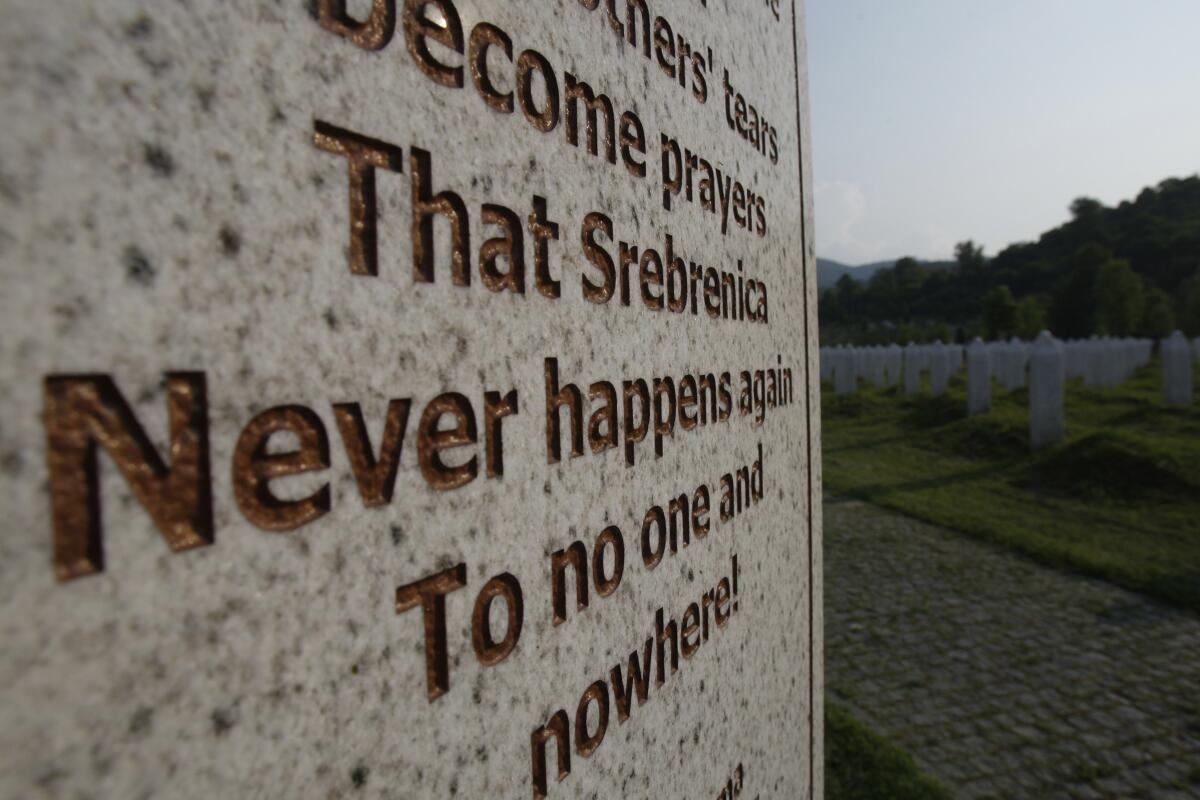Bosnians warn Ukrainians: It’s a long journey to justice

SARAJEVO, Bosnia — Regardless of how the Russian war in Ukraine ends, getting justice for human rights abuses suffered during the conflict will inevitably be a long and painful process for those who survive to tell of the atrocities they witnessed.
That’s the message from survivors of Bosnia’s 1992-95 internecine war, who have dedicated the ensuing years to the retelling and reliving of their trauma in hope of bringing those responsible to justice and setting the historical record straight.
“For me, it is personal. I am still searching for the remains of my brother. I cannot move on. I cannot focus on something else and leave that behind,” said Edin Ramulic from the northwestern Bosnian town of Prijedor.
Ramulic was a 22-year-old university graduate when, in April 1992, he and his male relatives, including his older brother and father, were rounded up by Bosnian Serbs, along with thousands of other non-Serb civilians from Prijedor and surrounding villages, to be deported from the area, imprisoned, tortured or killed.
More than 3,000 non-Serbs — including 102 children — were killed in Prijedor. Some were executed in their homes or in the streets, others in one of three prison camps where prisoners were subjected to beatings, rape, sexual assaults and torture. Ramulic’s brother, uncle and four cousins did not survive the camps.
Much like the graphic evidence of killings and torture in Bucha, outside Kyiv, that emerged earlier this month after Russian forces withdrew from the area, the discovery by international journalists of the camps in Prijedor in August 1992 provoked global outrage and calls by world leaders for those responsible to be held to account.
A process was put in motion by the United Nations Security Council to establish a special U.N. war crimes tribunal for the former Yugoslavia. When it was set up in The Hague in 1993, it was the first international court to investigate and prosecute allegations of war crimes, crimes against humanity and genocide since the tribunals in Nuremberg and Tokyo after World War II.
At first nobody thought it would work, the investigators’ access to crime scenes in Prijedor and elsewhere in Bosnia was blocked for years, and political leaders of the Bosnian Serbs and neighboring Serbia continued to deny human right abuses and hide documents and those indicted.
Justice was slow to come. Bosnian Serb wartime leader Radovan Karadzic and his military commander Ratko Mladic were fugitives from international justice until the late 2000s when they were tracked down in Serbia.
But by the time it shut down in 2017, the tribunal had convicted 83 high-ranking wartime political and military officials, most of them from Bosnia. It also transferred a mountain of evidence and cases against lower-ranking suspects to their home countries in the Balkans.
Desperate to find information about the fate of their loved ones and force the world to acknowledge their suffering, survivors like Ramulic changed their lives, setting up support groups for potential witnesses, collecting information about missing persons and commemorating the victims.
“I’ve spent countless months of my life in different courtrooms [as a witness], listening to defense counsels trying to deny the evidence,” Ramulic said.
“It sometimes happens that the people you know are guilty are set free because of the lack of evidence, but it is worth it,” he added.
Ramulic still does not know where his brother’s remains are or exactly who killed him and how, but the court sentences, some of which he had helped bring about, “are the most valuable thing that we have, because the evidence-based truth contained in them cannot be forever ignored and denied.”
In Munira Subasic’s former life, before the war, she was a shopkeeper, wife and the mother of two sons. Nothing prepared her for what she would become after losing her husband and a son in the 1995 Srebrenica massacre in which 8,000 men and boys died. It was the only episode of Bosnia’s war to be legally defined as genocide.
Amid their frantic search for their missing loved ones, Subasic and a number of other women created an organization, Mothers of Srebrenica, and engaged in street protests and other direct action to stay in the public eye and demand that mass graves be found, remains identified and those responsible for the massacre brought to justice. To date, almost 90% of those reported missing from the fall of Srebrenica have been accounted for.
“We knew the names of the killers, we collected them and shared the information with prosecutors, we visited every mass grave site, we searched for information about where others might be. We have been breathing down everyone’s neck, demanding justice,” Subasic said.
“Mothers of Ukraine will have to do the same,” she added.
Subasic, along with dozens of others, testified before the U.N. war crimes tribunal for former Yugoslavia, helping put behind bars close to 50 Bosnian Serb wartime officials, collectively sentenced to over 700 years in prison.
To get there, however, Subasic and other women of Srebrenica had to overcome the pain of constantly confronting people “who tried to hide that our children ever existed, who basically claimed that we were never mothers, that we never gave birth to anyone.”
“Russia’s denials of massacres its soldiers are now obviously committing in Ukraine sound to me the same as Srebrenica genocide denial,” Subasic said. “But if survivors are persistent, the truth will prevail.”
As for absolute justice, in Bosnia it remains elusive. The Bosnian war killed 100,000 people, most of them civilians, and upward of 2 million, or over half of the country’s population, were driven from their homes. Three decades since it started, some 7,000 of the war missing remain unaccounted for and the Bosnian judiciary has a backlog of over 500 unresolved war crimes cases, involving some 4,500 suspects. As the years pass and witnesses and suspects age, fall ill or die, many of the cases that remain open will likely never reach trial.
Jasminka Dzumhur, Bosnia’s human rights ombudsperson, was appointed last month by the U.N. Human Rights Council to serve as a member of its three-person commission to investigate possible human rights violations during the Russian invasion of Ukraine.
“It is very important that we know from experience what information is important to establish the evidence of human rights and humanitarian law abuses and what facts can later help relevant judicial bodies to prove individual criminal responsibility for such violations,” said Dzumhur.
“The commission is not a body that shall establish criminal responsibility for possible human rights violations and war crimes [in Ukraine], but it is a mechanism for gathering of facts that can help establish individual criminal responsibility,” she added.
Still, Dzumhur warned that it was important for survivors of human rights abuses and possible war crimes in Ukraine to understand “that their path to justice will be long and uncertain, that it will demand many sacrifices from them and that along the way they are unlikely to find many allies” who will be as committed as they are to the pursuit of truth.
More to Read
Sign up for Essential California
The most important California stories and recommendations in your inbox every morning.
You may occasionally receive promotional content from the Los Angeles Times.










